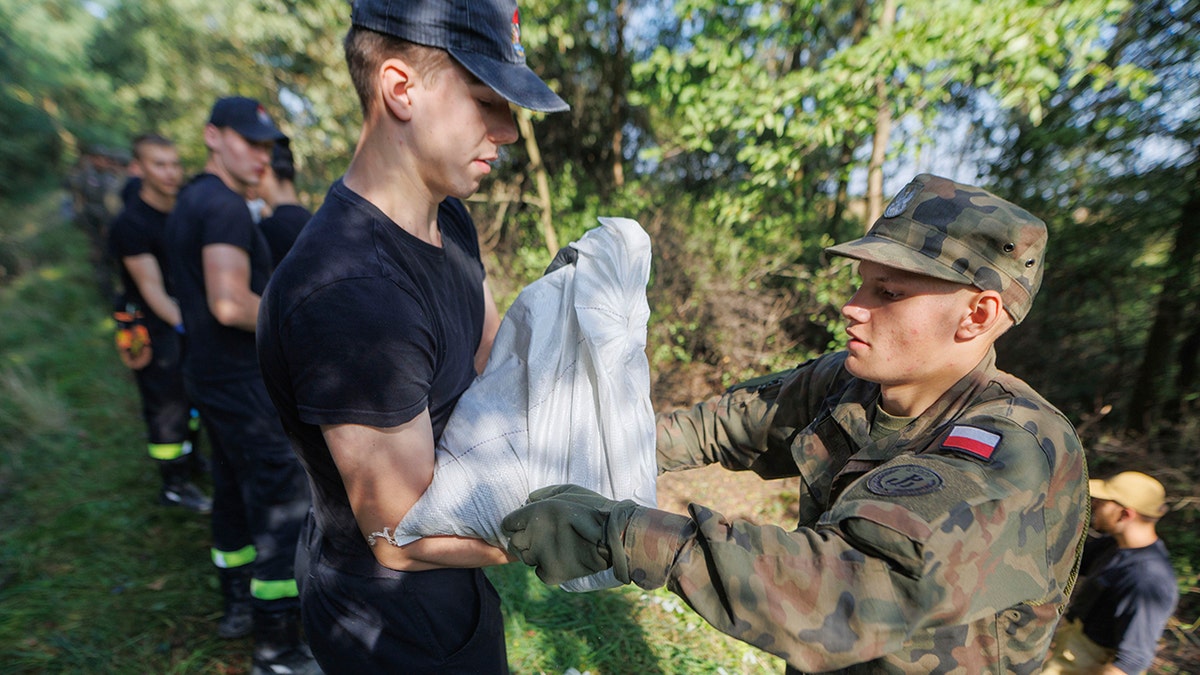Soldiers and firefighters used sandbags to shore up river embankments and delivered food and drinking water to isolated communities as the worst floods in years swept across a wide swathe of central Europe on Tuesday, killing people and destroying homes.
Heavy flooding has hit much of the region in recent days, particularly in the Czech Republic, Slovakia and Austria. Around 20 people have died in the floods, which followed heavy rains, but the human toll is not yet known. Victims have been reported in Romania, Austria, the Czech Republic and Poland.
ONLINE INFLUENCERS LEAD THOUSANDS IN DEMAND FOR CHANGE IN HUNGARY AFTER PRESIDENT RESIGNS
In some areas, the waters were receding, leaving behind mounds of debris. As reports of looting came in, government and military authorities vowed to crack down on the perpetrators. Gen. Wiesław Kukuła, chief of the Polish army’s general staff, said the military was deploying soldiers equipped with night vision and thermal imaging devices to support police in areas where residents were forced to flee to higher ground.
“Looters, the night and the lack of electricity will no longer be your allies,” he tweeted Monday evening.
Other places bracing for the worst to come include two central European gems: Budapest, the Hungarian capital on the Danube, and Wroclaw, a city in southwestern Poland on the Oder that is home to a Gothic cathedral and other historic monuments.
Hungary deployed soldiers to reinforce barriers along the Danube while thousands of volunteers filled sandbags at dozens of riverside settlements.

Soldiers fill and arrange sandbags to help reinforce levees and prevent flooding near the city of Wroclaw, southwestern Poland, Tuesday, Sept. 17, 2024. (AP Photo/Krzysztof Zatycki)
In Budapest, authorities have closed the lower quays, which were at risk of being breached by rising waters. The lower part of Margaret Island, the city's landmark, has also been closed.
In Wroclaw, firefighters and military personnel worked through the night to reinforce the river embankments with sandbags. The city's zoo, located on the Oder, called for volunteers to fill sandbags on Tuesday morning.
“We and our animals will be extremely grateful for your help,” the zoo said.
The city said it expected the flood wave to peak around Friday, although some had predicted it would happen sooner. Polish Prime Minister Donald Tusk met with a crisis team early Tuesday and said forecasts from meteorologists were conflicting.
Tusk's government has declared a state of natural disaster in southern Poland.
South of Wroclaw, residents spent the night fighting to save Nysa, a town of 44,000, after the Nysa Klodzka River flooded the day before. Mayor Kordian Kolbiarz said 2,000 “women, men, children, old people” were mobilized to try to save their town from the rising waters, forming a human chain that carried sandbags to the riverbank.
“We just did everything we could,” Kolbiarz wrote on Facebook. “This chain of people who fought for our Nysa was incredible. Thank you. We fought for Nysa. Our home. Our families. Our future.”
Later on Tuesday, Nysa authorities said the city centre had been saved from flooding.
In Bratislava, the Slovakian capital, Deputy Mayor for the Environment Jakub Mrva said the Danube had peaked and would slowly recede. He said mobile barriers had saved the historic centre but damage remained, particularly to tram lines.
“We also saw significant damage at the zoo, which is flooded, and there is relatively significant damage in the forests of the city of Bratislava, where many trees have died,” Mrva told The Associated Press in an interview, speaking next to the flooded banks of the Danube.
CLICK HERE TO GET THE FOX NEWS APP
In the Czech Republic, waters are receding in the two worst-hit regions in the northeast. The government has approved the deployment of 2,000 soldiers to help with clean-up operations. Damage is expected to reach billions of euros.
The Czech government has also provided assistance to local authorities in organising regional elections on Friday and Saturday, as several schools and other buildings used as polling stations were badly damaged. However, the planned evacuation of around 1,000 people in the town of Veseli nad Luznici may be postponed as the waters have not yet reached critical levels.
